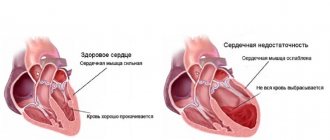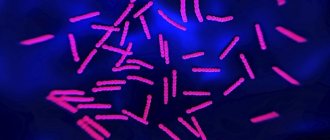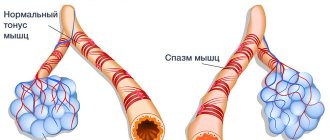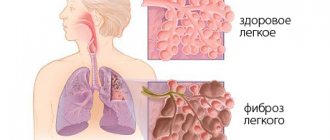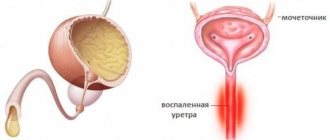The essence of pathology
The essence of the disease is disruption of the functioning of the kidneys due to any brought diseases. There are two types of kidney failure:
- acute;
- chronic.
The consequences of the disease, most often, are disorders associated with the excretion and formation of urine, and also a possible complication manifested in the form of uremia, that is, the body is poisoned by the resulting decay products, since the excretory function functions poorly or stops working altogether.
The acute form is not so scary; although it progresses quickly, it can be treated. But the development of the chronic form takes quite a long time, but the resulting complications cannot be restored.
Symptoms
Now let's define the symptoms of this disease, because they are different for both forms. It is advisable to know them in order to see a doctor in time and have time to prevent complications.
Acute renal failure
This form of renal failure can be treated; the main thing is to see a doctor in time. The disease can develop in a few hours, a maximum of 7 days. In this case, it is urgent to prescribe treatment. The development of acute renal failure occurs in 4 stages:
- The first is called shock. It lasts literally 1-2 days and is characterized by the following symptoms: feeling of cold;
- body temperature rises;
- the skin turns pale or yellow;
- Blood pressure drops and heart rate increases.
- the desire to eat food disappears;
- all indicators are normalized;
We recommend reading: Causes and treatment of urolithiasis in men and women
This period can last several years, that is, the disease subsides for a while.
Kidney failure leads to damage to liver cells, resulting in yellowing of the skin. If an acute condition has been observed, it may persist for several years, for example, by disruption of the liver or heart.
Chronic form
This form causes the development of irreversible processes in the kidneys. It leads to disturbances in the body’s excretory function, as a result of which the excretion may cease to function altogether.
A further possible complication is uremia due to the accumulation of nitrogenous metabolic products in the body.
When the disease just begins, it cannot be detected, since there are practically no symptoms. It is necessary to conduct special tests that will help identify deviations. The first signs will appear when more than 90% of the nephrons are destroyed:
- constant fatigue;
- reluctance to eat;
- the integument becomes pale and dry;
- blood discharge;
- blood deficiency;
- the digestive function is not working properly;
- muscle cramps;
- migraine;
- joint pain;
- the condition of hair and nails becomes significantly worse.
If for any reason or sign there is a possibility of developing renal failure, you need to urgently get tested and start treatment. If you manage in time, you can avoid all irreversible processes.
However, it is possible to determine the presence of the disease by the symptoms in this form after the development of irreversible processes has begun, so it is worth taking tests just in case to determine whether there is renal failure or not.
The role of diet therapy in the treatment of illness
Renal failure is a disorder accompanied by disruptions in all renal processes and impaired excretory function. Characterized by loss of the ability to partially or completely form and excrete urine. As a result, problems appear in the functioning of various body systems: protein metabolic products begin to accumulate in the blood, and the acid-base and water-salt balance is disturbed.
Acute renal failure is characterized by a reversible impairment of renal excretory function and a sudden decrease in the amount of urine excreted. This form of the disease is divided into three types:
- prerenal (impaired renal blood flow);
- renal (kidney damage);
- postrenal (urinary tract defect).
Acute kidney failure can result from:
- long-term use of medications;
- existing infections;
- poisoning with toxic substances;
- kidney injury.
At the initial stage, the symptoms are practically not expressed, only a decrease in the volume of urine excreted is noted. Then abdominal pain, nausea, pale skin, and tachycardia appear. As a result of retention of urea in the blood, the process of intoxication progresses, which is manifested by the following symptoms: swelling of the extremities, excitability or lethargy, diarrhea, increased blood pressure.
In the chronic form, the kidney tissue gradually dies and is replaced with connective tissue - such a violation of kidney function is irreversible and can develop for several months. The defeat is provoked by a number of factors:
- metabolic disease;
- diseases in which the outflow of urine from the kidneys is impaired;
- exposure to drugs and toxic substances.
| echinacea | autoimmune diseases (multiple sclerosis, lupus) |
| burdock root | pregnancy, lactation period |
| mint | varicose veins, pregnancy |
| shepherd's purse | increased blood clotting, pregnancy, hypertension |
| hawthorn | pregnancy, arrhythmia, low blood pressure |
| Dill seeds | hypotension, pregnancy |
| parsley root | pregnancy |
| Bay leaf | pregnancy, stomach ulcer |
| sea buckthorn | pancreatitis, cholecystitis |
| rose hip | increased blood clotting |
| flax seeds | cholecystitis |
| Juniper | pregnancy |
| pomegranate | stomach ulcer, hemorrhoids |
| pine needles | pregnancy, lactation period |
| raspberries | constipation, pregnancy |
| black currant | thrombophlebitis, pregnancy |
It is advisable to first consult with a specialist regarding the chosen traditional methods of therapy. The volume of medicinal infusions taken should be part of the amount of fluid intake recommended by the doctor. Otherwise, overdose and poisoning are possible.
The diet for renal failure is prepared by the attending physician and is based on compliance with several principles:
- limiting the amount of protein in the diet;
- providing the body with vitamins;
- calculation of optimal calorie content;
- control of the intake of water, salt and potassium into the body;
- reducing phosphate consumption.
Limiting the amount of protein you eat can reduce the formation of urea. At the first stage of the disease, it is recommended to consume no more than 0.8 g per 1 kg of weight per day. The basis should be high-value protein in the form of meat (including poultry) and eggs. As the disease develops, the volume of proteins is reduced, but it cannot be lower than 0.5 g per 1 kg of body weight.
The body must receive enough calories every day, so it needs food rich in carbohydrates and fats. The diet should include dishes made from potatoes, rice and vegetables, and if the level of potassium in the blood is high, avoid fried and baked potatoes. Cereal dishes are recommended, buckwheat porridge and pearl barley are especially useful. The energy value is increased using milk and vegetable fats. Salads should be seasoned with sour cream or vegetable oil.
The intake of water and salt into the body is adjusted depending on the stage of the disease, blood pressure level and existing edema.
You should not eat foods containing large amounts of phosphates. These include sausages, fish, processed cheeses, carbonated drinks, milk and canned goods containing it.
Impaired kidney function is dangerous for the human body. Attentive attention to your well-being will allow you to notice the first signs of the disease in time, will give you the opportunity to quickly seek help from specialists, and traditional medicine recipes will be an excellent help in the fight against the disease.
The disorder is a complex malfunction of the kidneys, which is accompanied by a complete or partial loss of the ability to synthesize and excrete urine. Doctors distinguish acute and chronic forms of PN. In the first scenario, there is a sudden decrease in the rate of excretion of nitrogen metabolism products, which leads to an electrolyte-water imbalance.
Why does kidney failure occur? There are many reasons that provoke the occurrence of a pathological condition. Acute PN develops against the background of other acute disorders of the functioning of internal organ systems of the body, including:
- states of shock with a sharp disturbance of hemodynamics;
- complex forms of infectious diseases with toxic shock and severe intoxication;
- profuse hemorrhages;
- obstruction of the urinary tract;
- acute kidney pathologies;
- developmental anomalies and congenital defects of the urinary organs;
- diseases associated with damage to the renal vessels, in particular atherosclerosis, endarteritis;
- acute heart failure.
The chronic course of the disease is diagnosed in patients suffering from hyperglycemia, arterial hypertension, systemic diseases, as well as urolithiasis and chronic inflammation of the kidney parenchyma. This disease is often diagnosed in people who are forced to constantly take medications or are chronically exposed to toxic substances.
Manifestations of the disease are directly related to the stage of its development:
- Shock stage. This period lasts several days and is manifested by severe chills and general body hyperthermia, a sharp decrease in blood pressure and a decrease in heart rate. Urine analysis determines protein, leukocytes and blood cells with pigments.
- Period of cessation of urine formation. Over the course of two weeks, phenol and nitrogen accumulate in the patient’s blood, which is accompanied by loss of appetite, dizziness, general weakness, the appearance of acetone odor from the breath, insomnia, nausea with occasional vomiting and the risk of developing pulmonary edema.
- Recovery period. At this time, the person feels better, appetite appears, and diuresis resumes.
- Full recovery. The patient continues to recover from the illness. During this period, kidney function normalizes and test results return to normal. This stage can last from a month to several years.
Diet plays one of the most important roles in the process of restoring renal function and preventing the worsening of the pathological condition. The main principles of diet therapy for PN are:
- enriching the body with vitamins and valuable microelements that ensure the normal course of metabolic processes;
- limiting a person’s consumption of protein foods, which impairs kidney function;
- reducing phosphate consumption;
- compliance with the recommended drinking regime;
- refusal of table salt;
- Calculation of calorie content of food and prevention of obesity.
In case of renal failure, protein intake should be minimized to approximately 0.5-0.7 g per kilogram of weight. The calorie deficit must be replenished by eating foods high in carbohydrates and fats. Dietitians recommend that patients with PN enrich their daily menu with vegetables, fruits, cereals and lactic acid products, as well as baked goods and sweets.
Modern doctors do not deny the effectiveness of traditional medicine in the fight against kidney failure. The only point is that such treatment should not be the main method of treating a pathological condition, but only an addition to it. In case of PN, folk remedies help strengthen the immune system, improve the body's metabolic state and help the body fight the disease.
This type of disease can be triggered in 60% of cases by injury or surgery, in 40% by drug treatment, and in 2% by pregnancy.
The following conditions may be the causes of development:
- Traumatic shock.
- Heavy blood loss.
- Poisoning with neurotropic poisons.
- Intoxication with medications, radiopaque substances.
- Infectious diseases such as cholera, sepsis, dysentery.
- Thrombosis and embolism are dangerous.
- Acute pyelonephritis or glomerulonephritis.
- Abortion.
- Burns to large areas of the body.
- Blood transfusion if incompatibility is detected.
- Continuous vomiting.
- During pregnancy - severe toxicosis.
- Myocardial infarction.
- Tumor formation or stones in the ureter.
With all these conditions, there is a possibility of developing kidney disease, so you need to know the first symptoms of the disease.
The development of a chronic form can be provoked by the following conditions:
- Chronic glomerulonephritis.
- Stones in the kidneys.
- Obstruction of the ureters.
- Renal polycystic disease.
- Long-term use of certain groups of medications.
- Lupus, diabetes.
- Chronic pyelonephritis.
- Echinacea tincture. Echinacea tincture will be useful in the treatment of kidney failure. It is not difficult to prepare this remedy at home. All parts of the plant have healing properties, so both roots and leaves with inflorescences are suitable for preparing medicine. 50 g of dry raw materials (or 150 fresh) must be poured with a liter of vodka and left to infuse for two weeks in a cool, dark place. From time to time the container with the tincture needs to be shaken. When the time is right, strain the medicine through cheesecloth. A single dosage of echinacea tincture is 10 drops. They are diluted with purified water and taken three times a day. The course of treatment is six months.
- Linen. A good folk remedy for treating kidney failure is flax. Its seeds (1 teaspoon) are brewed in a glass of boiling water, then boiled for two minutes over low heat. Then the broth is left for a couple of hours and, when it has cooled, strain and drink half a glass three to four times a day.
- Horsetail. A classic remedy for the treatment of kidney diseases is horsetail. It has a bactericidal, diuretic, astringent and anti-inflammatory effect, helps restore water and electrolyte balance. Horsetail grass must be dried and crushed before preparing the medicine. Then three tablespoons of raw material are poured with half a liter of boiling water and simmered for half an hour over low heat. After this, the decoction should be left for two hours, strained and drunk in three to four doses.
- Dill seeds. Dill is a good helper in the treatment of kidney diseases. Its seeds are ground in a mortar and poured with water in a ratio of 1:20. You should take the medicine four times a day, drinking half a glass. Dill will have an anti-inflammatory, analgesic and diuretic effect.
- Sea kale. Laminaria, a seaweed rich in iodine, vitamins and provitamins, is also a useful medicine. In case of kidney failure, it is consumed as food, added to salads. It will help improve the functioning of the kidneys and their elimination of metabolic products. It is enough to eat 100 g of kelp per day. But before using it, check with your doctor.
DETAILS: The cat has stage 3 chronic renal failure
Kidney failure is a malfunction of the urinary system, in which the kidneys partially or completely stop coping with their tasks.
Causes
Each form of kidney failure has its own causes of formation, which we will now consider.
Acute form
For this form of the disease, the causes may be:
- Shock kidney. This is a consequence of traumatic shock.
- Toxic kidney. This refers to poisoning with neutropic poisons.
- Acute infectious kidney. This happens due to the impact on the body of various infectious diseases.
Most often, acute renal failure occurs due to injury or surgery, sometimes during treatment in a medical facility, and very rarely the cause is pregnancy.
Chronic
In this case, the reasons may be:
- chronic gromerulonephritis;
- the kidneys are affected.
Diagnostics
Diagnostic methods vary depending on the form of the disease. For chronic renal failure, it is carried out as follows:
- All data is collected, when the first symptoms appeared, what they were, what is the amount of urine emitted per day, whether the person gets tired and how much, the medical history is fully studied to determine the cause of kidney failure.
- Then the examination of the patient begins. It is determined whether there is swelling or not, the color of the skin is observed, and whether there is a smell of urine from the mouth.
- The next step is to examine the patient’s urine. If he is really sick, its density will be reduced, and some protein will be found in the urine content.
- Blood tests should be carried out: general and biochemical.
- Diagnostics are also carried out using special devices, for example, MRI, ultrasound, CT.
We recommend reading: Acute and chronic glomerulonephritis - treatment regimen for adults and children
Then the doctor summarizes all the data obtained during diagnosis and prescribes treatment for the patient.
In acute renal failure, there is an increase in potassium nitrogen and nitrogenous compounds in the blood due to the fact that little or no urine is excreted from the body. A Zimnitsky test must be taken from the patient to determine the daily amount of urine output. Of course, you need to monitor your blood biochemistry.
When diagnosing acute renal failure, it is important to determine its form. To do this, an ultrasound of the kidneys and bladder should be performed. If necessary, an ultrasound scan of the renal vessels is performed. Suspicion of tubular necrosis, acute glomerulonephritis, or systemic disease is an indication for renal biopsy.
You may be interested in an article about the treatment of urolithiasis in men and women.
There is also an article about the rules for treating kidneys at home.
Here you will learn how to treat acute and chronic glomerulonephritis.
Treatment of chronic renal failure
If this form of the disease is present, treatment is limited to preventing the underlying disease from developing. The doctor must detect the disease at an early stage and ensure that kidney function does not change.
The chronic form is treated with hemodialysis and perineal dialysis. All this is done in the hospital, and the procedure is simple, after which the patient can go home. All this is done before the new kidney is transplanted. Only this can stop irreversible processes.
The donor can be a relative or a recently deceased person. Before transplantation, appropriate compatibility tests are carried out. After transplantation, the kidney takes as long as a year to take root. There is a greater chance of a favorable outcome if the donor is a relative.
After the transplant, the patient will have to take immunosuppressants for the rest of his life, which is bad for his health. His immunity will significantly decrease and the likelihood of contracting infectious diseases will increase.
Symptoms of chronic acute failure
First of all, it is worth understanding that this kind of deficiency is not so much a disease as a syndrome. Gradually, the work and functioning of the kidneys, or in other words, ESRD, begins to stop. When this syndrome occurs, many functions of the human body are disrupted. The sad thing is that it all happens at the same time. The types of exchange that suffer first are:
- electrolyte;
- water;
- nitrogenous;
- and naturally, hormonal.
The process is divided into two forms of possible development: acute and chronic. But there are three stages of severity: the first is the risk of pathology, the second is damage to the mucous membranes and surface of the kidneys, the third is renal failure.
It is worth understanding that renal failure is not so much a disease as a syndrome
If a person has not noticed that there is a risk of occurrence, and this is where it all begins, then everything goes into the stage of damage. This is where the problems begin. Two areas of human life are immediately affected: blood pressure increases sharply, there is a high risk or already the development of diabetes mellitus.
To guess the presence of renal failure, there are few symptoms and treatment with folk remedies or medications is not worth starting. You will need to undergo a series of examinations. A number of serious diseases have exactly the same symptoms as kidney dysfunction. And among them is the oncological process at the third and fourth stages of development.
The main examination is a biological blood test. It examines the level of potassium and nitrogen compounds. These connections show all the important and significant changes that have occurred in the kidneys. As soon as it is discovered that the concentration of substances (urea, creatine and others) is increased, they move on to the next stage of examination.
The main examination is a biological blood test
Medication therapy involves eliminating the root cause. At the same time, symptomatic treatment should also be provided, helping to reduce the load on all systems and organs. If there is already intoxication of the body. Cleansing of the body and artificial filtration of the blood will be required. After which taking sorbents is mandatory.
The presence of infection already alters therapeutic treatment. Now the use of antibiotics is required. Compliance with all hygiene rules is strictly necessary. Pay special attention to mucous membranes. The basis of treatment for any stage of the disease and its form will be a diet that does not contain protein at all.
As mentioned above, kidney function in this condition can be fully restored if you consult a doctor in time. This disease can develop over a short period of time, from several hours to seven days.
This condition lasts from a day or more. The main thing is not to ignore the symptoms if it is acute renal failure. Treatment should be prescribed immediately.
The development of the disease can be divided into 4 stages.
The first period - shock - lasts a couple of days. The following symptoms appear:
- Chills.
- Increased body temperature.
- Pale or yellowish skin.
- Tachycardia, low blood pressure.
In the second period, urine stops forming, nitrogen and phenol accumulate in the blood. It lasts approximately one to two weeks and also has the following manifestations:
- Lost appetite.
- Weakness, headache, dizziness.
- Insomnia.
- Nausea and vomiting.
- Smell of ammonia.
- Possible pulmonary edema.
The third period is called recovery, the condition may improve, or it may worsen. In some cases, a person develops an appetite and begins to feel much better.
The fourth period is also a recovery period, it is characterized by the fact that:
- The indicators are returning to normal.
- Kidney functions are restored.
This period can last from several months to several years.
However, it is worth noting that with this disease, liver cells are also damaged, which explains the yellowness of the skin. If there was an acute condition, its symptoms may be reminiscent of the disrupted functioning of internal organs, for example, the liver or heart muscle, for another year or two.
- Fast fatiguability.
- Decreased appetite.
- Pale and dry skin.
- Nausea and vomiting.
- Bleeding.
- Anemia.
- Edema.
- Indigestion.
- Muscle cramps.
- The appearance of aphthous stomatitis.
- Frequent headaches.
- Possible tremor of the limbs.
- Joint pain.
- The condition of hair and nails worsens.
It is very important not to miss symptoms if there are concerns that kidney failure may develop. Treatment must be started as quickly as possible. This is the only way to prevent irreversible changes.
If the cause is the patient's shock, it is necessary to normalize blood pressure and replace blood loss, if any.
In case of poisoning, first of all, it is necessary to rinse the patient’s stomach and intestines. In case of poisoning with toxic substances, it is possible to cleanse the body using the method of extracorporeal hemocorrection.
Also, removing stones or tumors from the ureter or bladder normalizes the patient’s condition. All these procedures are performed at the initial stage of the disease.
Next, activities are carried out that will contribute to the narrowing of arteries and blood vessels. Areas with tissue necrosis are removed, and antibiotic therapy is prescribed taking into account the damage to the renal tissue. The patient is prescribed a special protein-free diet. Drug treatment of kidney failure includes the following drugs:
- "Furosemide".
- "Cocarboxylase-Ellara".
- "Losartan."
- "Trometamol."
- "Reogluman".
- "Mannitol."
At an early stage of the development of kidney failure or for preventive purposes, the doctor may prescribe hemodialysis. It is indicated if the doctor sees that there is a violation of kidney function and a deterioration in metabolism. Hemodialysis is done to prevent complications. This procedure allows the blood to be cleaned before it passes through the kidneys.
DETAILS: Wife massages husband's prostate at home
To treat the chronic form, hemodialysis and peritoneal dialysis are used. They are performed in a medical facility, but do not require hospitalization; after the procedure, the patient can go home.
The patient can perform peritoneal dialysis independently. It is enough to visit the doctor once a month. This procedure is used for treatment while the patient is awaiting a kidney transplant, since this disease triggers irreversible processes, and this is the only way to maintain the patient's condition.
Transplantation is the replacement of a damaged kidney with a donor organ. It can be either a relative or a recently deceased person. At the beginning, many compatibility tests are carried out. After the operation, the kidney takes root within a year. One healthy kidney replaces the work of two sick ones. If the donor is a relative, then the chances of a favorable outcome increase.
After a kidney transplant has been performed, the patient is prescribed immunosuppressants, which will need to be taken for the rest of his life. There is one negative point: while taking these drugs, a person’s immunity is noticeably reduced, and he can easily become infected with any infectious disease.
The task of the patient and the doctor is the following: even with a diagnosis of renal failure, treatment should be aimed primarily at preserving kidney function. Every effort must be made to improve the patient’s quality of life.
The following points can be included in the prevention of kidney failure:
- First of all, treat the underlying diseases.
- Follow a diet.
- Conduct prevention and treatment of chronic pyelonephritis and chronic glomerulonephritis.
- Undergo a thorough examination and carry out timely treatment of kidney diseases, avoiding complications.
- Treat arterial hypertension.
- Infectious diseases of the kidneys and genitourinary tract should be eliminated in the early stages; it is important to complete the course of therapy to the end.
- Patients who have suffered acute renal failure should be regularly observed by a doctor and monitor blood and urine counts.
When diagnosed with renal failure, treatment and medications should only be prescribed by a specialist, otherwise it can lead to the death of the patient. This is not the case when you can self-medicate. The kidneys are a very important organ, and their health must always be taken care of.
Actions in acute form of the disease
The essence of treatment is to eliminate the factors that cause exacerbation. Treatment also depends on the cause of the disease.
- If acute renal failure occurs due to a state of shock, then you will need to normalize your blood pressure. If there are blood losses, they need to be replenished.
- If the cause is poisoning, you will need to wash the stomach and intestines.
To normalize the patient’s condition, it would not hurt to remove stones or tumors from the ureter or bladder. This can be done at the initial stage of the disease. Then it is necessary to narrow the arteries and blood vessels.
We recommend reading: How to treat a kidney cyst at home
We bring to your attention a video that explains the symptoms and possible causes of kidney failure in humans:
General information about the disease
Renal failure is a dysfunction of the kidneys, accompanied by a sharp decrease in the level of urination, toxic accumulations of metabolic products in the blood, and changes in the state of water and electrolyte balance in a person.
There are two forms of this disease - acute and chronic. There are quite a few reasons for the development of the disease: injury, blood transfusion, poisoning with drugs, salts of heavy metals, animal or plant poisons, acute kidney infections.
The development of chronic renal failure proceeds slowly and can drag on for up to several years, which leads to impaired kidney function, deformation of their appearance due to wrinkling, and intoxication of the human body.
The occurrence of this form is possible with any chronic kidney disease due to the fact that the nephrons of this organ partially die.
Chronic renal failure (CRF) is a long-term disease that consists of four stages:
- latent;
- compensated;
- intermittent;
- terminal.
The manifestation of symptoms of chronic renal failure at the initial stage is so weak that they can only be noticed during exercise, eating foods high in salt, drinking a large amount of alcoholic beverages, or disrupting the diet.
This is expressed by mild morning swelling of the face, loss of strength and decreased performance, pain in the lumbar area, as well as pasty fatty tissue. As the disease intensifies, the process of urination is disrupted, sleep is disrupted, dry mouth occurs, and polyuria appears.
Treatment with folk remedies
It is worth warning that before using these methods you should consult a doctor, otherwise you may make things worse.
- Dill can be used for treatment. It eliminates inflammation and is also a diuretic. To prepare, use dill seeds (one part), chop it well and add water (20 hours). Take half a glass 4 times a day.
- You can also use seaweed. They help improve metabolism. Add them to your food, about 100 grams is enough.
- Juniper also has the same properties. You need to pour one spoon into a glass of boiling water and let it brew for about an hour. Take the infusion 4 times a day, 1 tablespoon.
- Horsetail has many useful properties, for example, diuretic. You need to take 3 tablespoons, pour half a liter of water over them and boil for half an hour. Drink throughout the day, you need to drink everything in 3-4 doses.
With chronic renal failure, the following infusions will help weaken the development:
- Mix 30 grams of flowers such as tricolor violet, St. John's wort, elderberry, then 50 grams of dandelion, and 80 grams of chamomile. From the resulting mixture you need to take 1 tablespoon, pour a glass of boiling water and boil for 1 minute.
- Burdock root will help improve your condition. The root should be crushed, pour in hot water and leave to infuse overnight. The infusion should be drunk throughout the day.
- Walnuts mixed with honey and infused for a month in a dark place will help strengthen the immune system and cleanse the blood.
How to treat the disease?
Many patients do not trust drug therapy; they prefer non-standard treatment methods. In many cases, treatment of renal failure with folk remedies helps to almost completely eliminate the signs of the disease and speed up recovery. The optimal dosage, methods and frequency of taking medications can only be regulated by the attending physician. There are many recipes that can cure kidney failure.
Diuretic herbs
To stimulate the functioning of the kidneys and urinary system, decoctions that have a diuretic effect are used. To prepare a diuretic decoction, you can use coltsfoot, birch buds, bearberry, peppermint or violet leaves.
To prepare the product, you will need 2 heaping tablespoons of raw material, which you need to pour with two glasses of hot water and place in a water bath for about 15 minutes. Afterwards, the broth needs to be cooled and passed through a sieve. You need to drink 1/3 cup of the decoction three times a day.
The recommended course is 2 months, during this period you should reduce the consumption of salt, fried and smoked foods. It is necessary to adhere to the drinking regime - drink 2.5 liters of liquid per day. These herbs are contraindicated for people with individual intolerance and children under 3 years of age.
Herbal collection
This product contains more than a dozen ingredients. To prepare it you will need:
- lavender – 1 tbsp. spoon;
- dry or fresh birch leaves - 1 tbsp. spoon;
- plantain leaves - 2 tbsp. spoons;
- nettle leaves - 3 tbsp. spoons;
- juniper berries – 1 tbsp. spoon;
- rose hips - 4 tbsp. spoons;
- strawberry leaves - 6 tbsp. spoon;
- lingonberry leaves - 1 tbsp. spoon;
- currant leaves - 1 tbsp. spoon;
- hop cones – 1 tbsp. spoon;
- budra grass – 1 tbsp. spoon;
- horsetail – 6 tbsp. spoon;
- initial letter – 2 tbsp. spoons.
All components must be combined in one container, then ground to a powder. 20-30 gr. put the raw materials in a thermos, pour 0.5 ml of boiling water, leave for an hour. Divide the resulting volume into 3 doses and drink per day. Natural honey can serve as a sweetener. The course of treatment is 6 months; contraindications may include intolerance to the components and age under 6 years.
Bird cherry decoction and sea buckthorn tea
To prepare bird cherry broth, you need:
- Rinse one glass of ripe bird cherry fruits.
- Pour 200 ml of boiled water over the fruits, put on fire and simmer for half an hour.
- Cool the liquid, strain through a sieve, and drink throughout the day.
Sea buckthorn has always been famous for its healing qualities. To prepare a medicinal decoction you will need:
100 g of fresh or dried sea buckthorn and rose hips;- 50 ml fresh lemon juice;
- 200 ml water;
- sugar to taste.
Pour rosehip and sea buckthorn berries separately into a colander, pour boiling water over them, and place on a paper towel to dry. Then grind them through a meat grinder, pour them into a thermos, pour 200 ml of boiling water, leave for 1-2 hours. Cool the infusion a little, strain, add sugar and lemon juice. This drink should be divided into 3 doses per day. It is advisable to discuss the course of treatment with your doctor.
Contraindications – allergies to components.
Treatment with fruits and berries
Treatment with folk remedies consists not only of herbs, but also of eating fruits and berries, so the medicine is not only useful, but also tasty. For example:
- Watermelon. This huge berry can be consumed in unlimited quantities. It perfectly cleanses the kidneys and eliminates their inflammation. Both the pulp and the crusts can be consumed. For example, you can prepare the following drink:
- Chop two watermelon rinds into pieces;
- wrap in a warm towel and leave for about an hour;
- then strain the tincture and you can drink it instead of water throughout the day.
pour 0.5 liters of boiling water;
Flaxseeds. Mix a teaspoon of flaxseeds with 200 ml of boiling water, cook them over low heat. Remove from heat, cover, and cool for 2 hours. Strain, drink 100 ml in three doses. Flaxseeds are used as a nutritional supplement; they are mixed with kefir, yogurt, and sprinkled on salad. They will not only help in treating the kidneys, but also normalize digestive processes.
Preventive measures
Since this is a very serious disease, preventive measures should be taken regularly:
- diets;
- visit doctor;
- do not overwork yourself;
- use as few analgesics as possible;
- completely eliminate alcohol.
To prevent this disease, be sure to visit a doctor. You can use the proposed folk recipes as prevention.
We recommend that you watch a video that explains the features of the diet for kidney failure:
